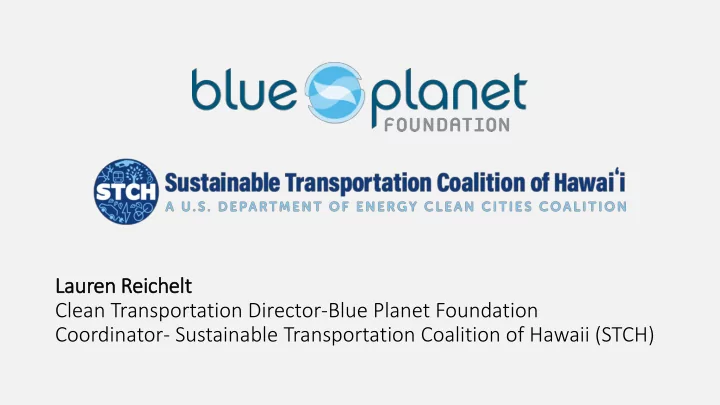

La Lauren Reichelt Clean Transportation Director-Blue Planet Foundation Coordinator- Sustainable Transportation Coalition of Hawaii (STCH)
National Network of Clean Cities Coalitions Nearly 100 Clean Cities coalitions with thousands of stakeholders, representing ~80% of U.S. population cle cleancities.energy.g .gov
Clean Cities Focus Light-, Medium-, and Heavy-Duty Vehicles Alternative Fuel Infrastructure Energy Efficient Mobility Systems and Technologies
Why EVs? • EVs produce less greenhouse gas emissions and use less petroleum over the lifetime of the vehicle – even now, with the current grid mixes across the state • EVs can be more cost effective over the lifetime of the vehicles • Market-ready and proven models exist in some vehicle segments and for a variety of use-cases • EoT benefits the state overall with energy security and resiliency
Approximate Emissions Produced at Utility 1 kWh 2 pounds produced by CO 2 Emissions fossil fuels at the utility 1 kWh produced by 1.44 pounds 78% fossil fuels CO 2 Emissions & 28% renewables
Battery Electric Vehicle Emissions 1.44 pounds CO 2 emissions per 1 kWh produced About 3.5-4 miles per kWh to .411 pounds CO 2 per mile driven .36 pounds CO 2 per mile driven
Gasoline Vehicle Emissions 19.59 pounds CO 2 emissions per gallon 22 MPG 30 MPG 40 MPG 54 MPG .65 pounds CO 2 /mi .363 pounds CO 2 /mi .89 pounds CO 2 /mi .489 pounds CO 2 /mi
Electric Vehicles to .411 pounds CO 2 per mile driven .36 pounds CO 2 per mile driven Gas-powered Vehicles 22 MPG 30 MPG 40 MPG 54 MPG .65 pounds CO 2 /mi .363 pounds CO 2 /mi .89 pounds CO 2 /mi .489 pounds CO 2 /mi
July 2019 solicitation (900 MW) Early 2019 projects (247 MW) Currently under development
CO2 Emissions/Mile EV versus Hybrid Average Vehicle in Hawaii 1 (22 MPG) 0.9 0.8 Pounds CO2/Mile 0.7 Most Efficient Least Efficient 0.6 Gas-Powered Battery Electric Hybrid Vehicle 0.5 Vehicles (54 MPG) 0.4 0.3 Most Efficient 0.2 Battery Electric Vehicles 0.1 0 2015 2020 2025 2030 2035 2040 2045 Year
CO2 Emissions/Mile EV versus Hybrid Least Efficient Battery Electric 0.45 Vehicles 0.4 0.35 Most Efficient Pounds CO2/Mile Most Efficient 0.3 Gas-Powered Battery Electric Hybrid Vehicle Vehicles 0.25 (54 MPG) 0.2 0.15 0.1 0.05 0 2015 2020 2025 2030 2035 2040 2045 Year
2018 • Embedded emissions paid off after 2 years compared to internal combustion engine vehicles (ICEs) • 1.5 years if charged from renewables 2015 • Embedded emissions paid off between 6 and 16 months of driving depending on vehicle model and where they’re sold
$7,500 Federal Tax Credit
Solar Photovoltaic
Group Purchasing
Source: Bloomberg New Energy Finance
2020 Kia Soul EV 243-mile range 2019 Nissan Leaf 64kWh battery 215-mile range Estimated base $37,500 62kWh battery $37,445 Hyundai Kona Electric SUV 2019 Kia Niro Electric 258-mile range 239-mile range 64kWh battery 64kWh battery $36,950 $38,500
Cobb County, Georgia (2017) • ”Mission - specific fuel use” • 23 Nissan Leaf PEVs for employees
City of Sacramento (2011-2016) • Department of General Services • 2011-2016 incorporated 60 plug- in hybrid and BEVs into their fleet • Motorpool Level 2 chargers that partially rely on solar • Additional chargers for city employees
Rivian R1T • 230-400 miles driving range • 754 horsepower • Can tow 11,000 pounds • 230-mile range version coming late 2020 • $69,000 • Also releasing a 7-passenger SUV
25 electric/hybrid 13 EV models by Electrifying its entire 20 EV models models by 2025 2023 and pledged portfolio by 2022 and by 2023 and $500M in Rivian Daimler is investing plans to phase $10B in EVs out gas vehicles All electric/hybrid 10 EV models by early 22 million BEVs by 2029 vehicles by 2019 2020s, investing $13B by 2030 into EVs and batteries
Source: Bloomberg New Energy Finance
La Lauren Reichelt 414∙303∙8818 la lauren@blueplanetfoundation.o .org Clean Transportation Director-Blue Planet Foundation Coordinator- Sustainable Transportation Coalition of Hawaii (STCH)
Recommend
More recommend